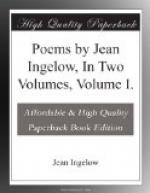He worked, and bravely he fulfilled his trust—
So long he wandered sowing worthy seed,
Watering of wayside buds that were adust,
And touching for the common ear his reed—
So long to wear away the cankering rust
That dulls the gold of life—so
long to plead
With sweetest music for all souls oppressed,
That he was old ere he had thought of rest.
Old and gray-headed, leaning on a staff,
To that great city of his birth he came,
And at its gates he paused with wondering laugh
To think how changed were all his thoughts
of fame
Since first he carved the golden epitaph
To keep in memory a worthy name,
And thought forgetfulness had been its doom
But for a few bright letters on a tomb.
The old Astronomer had long since died;
The friends of youth were gone and far
dispersed,
Strange were the domes that rose on every side;
Strange fountains on his wondering vision
burst;
The men of yesterday their business plied;
No face was left that he had known at
first;
And in the city gardens, lo, he sees
The saplings that he set are stately trees.
Upon the grass beneath their welcome shade,
Behold! he marks the fair white monument,
And on its face the golden words displayed,
For sixty years their lustre have not
spent;
He sitteth by it and is not afraid,
But in its shadow he is well content;
And envies not, though bright their gleamings are,
The golden letters of the vanished star.
He gazeth up; exceeding bright appears
That golden legend to his aged eyes,
For they are dazzled till they fill with tears,
And his lost Youth doth like a vision
rise;
She saith to him, “In all these toilsome years,
What hast thou won by work or enterprise?
What hast thou won to make amends to thee,
As thou didst swear to do, for loss of me?
“O man! O white-haired man!” the
vision said
“Since we two sat beside this monument
Life’s clearest hues are all evanished;
The golden wealth thou hadst of me is
spent;
The wind hath swept thy flowers, their leaves are
shed
The music is played out that with thee
went.”
“Peace, peace!” he cried, “I lost
thee, but, in truth,
There are worse losses than the loss of youth.”
He said not what those losses were—but
I—
But I must leave them, for the time draws
near.
Some lose not ONLY joy, but memory
Of how it felt: not love that was
so dear
Lose only, but the steadfast certainty
That once they had it; doubt comes on,
then fear,
And after that despondency. I wis
The Poet must have meant such loss as this.
But while he sat and pondered on his youth,
He said, “It did one deed that doth
remain,
For it preserved the memory and the truth
Of her that now doth neither set nor wane,
But shine in all men’s thought; nor sink forsooth,
And be forgotten like the summer rain.
O, it is good that man should not forget
Or benefits foregone or brightness set!”




